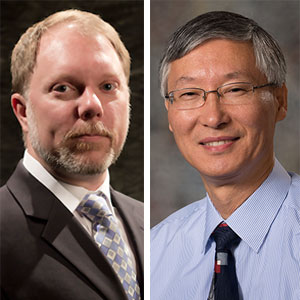Calendar Icon
Nov 23, 2015
![]() RSS
Submit a Story
RSS
Submit a Story

RELATED LINKS
Two Nebraska Engineering faculty – Mark Riley, department head and professor of biological systems engineering; and Tian Zhang, professor of civil engineering – are among a record eight UNL faculty members who have been named fellows of the American Association for the Advancement of Science, the world's largest general scientific society.
Fellows are selected by their peers for scientifically or socially distinguished achievements that advance science or its application.
The 347 members who were elected AAAS fellows this year will be formally announced in the Nov. 27 issue of the journal Science and will be recognized Feb. 13 at the AAAS annual meeting in Washington, D.C.
Riley's research to develop novel sensors has contributed significantly to fields as diverse as agriculture, public health and renewable energy. He is also regarded for his national leadership in advancing the young field of biological engineering, which integrates life sciences and engineering to create new knowledge, products and processes.
Riley has developed sensors to monitor and evaluate a diverse array of biological systems and processes, including renewable biofuels production, microbes in drinking water, inhaled airborne particulates and fruit ripeness.
"My early professional training helped me see the value of theory and simulation, but I wanted my work to have a greater and more immediate impact," Riley said. His applied studies connect foundational research with immediate questions, and he enjoys working at the interface between controlled laboratory experiments and field studies.
His national leadership in the biological engineering field includes heading newly established committees and institutes and spearheading the launch of the Journal of Biological Engineering.
Riley said the recognition was a happy surprise. "I am pleased that our team's translational work, connecting biologists and engineers towards the development of biological engineering as a field, is being recognized."
Civil engineer Zhang's research focuses on water and wastewater treatment as well as hazardous remediation. He also contributes significantly to an international collaboration that produces books on critical global topics.
Zhang's work has helped advance wetland restoration, nutrient mitigation in agricultural settings, gray water reclamation and reducing nitrates and other contaminates in groundwater. He also studies creating biofuels and other bioenergy sources from biodegradable waste and other organic matter.
In a recent deviation, Zhang collaborates with UNL electrical engineers and University of Nebraska Medical Center researchers to develop cancer detection tools. The ability to immediately differentiate between normal cells and cancer cells will help surgeons safely remove cancer tissue during breast lumpectomies while preserving healthy tissue.
Zhang also is highly regarded for his volunteer activities as an international adviser and for his tremendous productivity in writing and coordinating the publication of numerous multi-authored books on current topics, such as climate change, nanotechnology and carbon sequestration.
Zhang said he was surprised and excited by his AAAS fellowship, and appreciates the recognition.
Fellows are selected by their peers for scientifically or socially distinguished achievements that advance science or its application.
The 347 members who were elected AAAS fellows this year will be formally announced in the Nov. 27 issue of the journal Science and will be recognized Feb. 13 at the AAAS annual meeting in Washington, D.C.
Riley's research to develop novel sensors has contributed significantly to fields as diverse as agriculture, public health and renewable energy. He is also regarded for his national leadership in advancing the young field of biological engineering, which integrates life sciences and engineering to create new knowledge, products and processes.
Riley has developed sensors to monitor and evaluate a diverse array of biological systems and processes, including renewable biofuels production, microbes in drinking water, inhaled airborne particulates and fruit ripeness.
"My early professional training helped me see the value of theory and simulation, but I wanted my work to have a greater and more immediate impact," Riley said. His applied studies connect foundational research with immediate questions, and he enjoys working at the interface between controlled laboratory experiments and field studies.
His national leadership in the biological engineering field includes heading newly established committees and institutes and spearheading the launch of the Journal of Biological Engineering.
Riley said the recognition was a happy surprise. "I am pleased that our team's translational work, connecting biologists and engineers towards the development of biological engineering as a field, is being recognized."
Civil engineer Zhang's research focuses on water and wastewater treatment as well as hazardous remediation. He also contributes significantly to an international collaboration that produces books on critical global topics.
Zhang's work has helped advance wetland restoration, nutrient mitigation in agricultural settings, gray water reclamation and reducing nitrates and other contaminates in groundwater. He also studies creating biofuels and other bioenergy sources from biodegradable waste and other organic matter.
In a recent deviation, Zhang collaborates with UNL electrical engineers and University of Nebraska Medical Center researchers to develop cancer detection tools. The ability to immediately differentiate between normal cells and cancer cells will help surgeons safely remove cancer tissue during breast lumpectomies while preserving healthy tissue.
Zhang also is highly regarded for his volunteer activities as an international adviser and for his tremendous productivity in writing and coordinating the publication of numerous multi-authored books on current topics, such as climate change, nanotechnology and carbon sequestration.
Zhang said he was surprised and excited by his AAAS fellowship, and appreciates the recognition.
Submit a Story